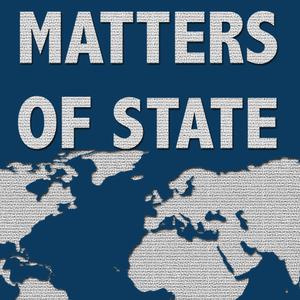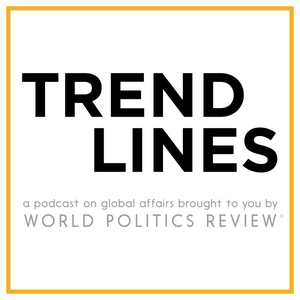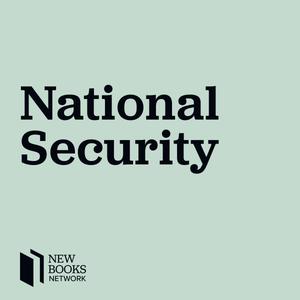
The Institute of World Politics
The Institute of World Politics
The Institute of World Politics is a graduate school of national security and international affairs, dedicated to developing leaders with a sound understanding of international realities and the ethical conduct of statecraft, based on knowledge and appreciation of the principles of the American political economy and the Western moral tradition. **Please note that the views expressed by our guest lecturers do not necessarily reflect the views of The Institute of World Politics.**
- 1 hour 3 minutesPig Butchering and National SecurityAbout the Lecture: Pig Butchering, a slang Chinese term for the process of “fattening the pig before the slaughter”, has become synonymous with crypto investment scams. Investment scams have become the most costly cyber-enabled crime reported to the FBI, with reported losses exceeding $4.5B. Across the globe, some studies estimate losses over $63B. In this discussion, we will differentiate between investment scams and Pig Butchering scams, and also learn about the implications to national security and global security from Pig Butchering and its ties to organized crime and nation state threats. About the Speaker: Robin J. Pugh is the President of DarkTower, a bespoke threat intelligence firm that leverages University partnerships and research to provide managed threat intelligence services to industry leaders in banking, insurance, law enforcement, and ecommerce. DarkTower focuses on disrupting internet-enabled crime and training the next generation of cybercrime fighters. In 2023, Robin brought together a team of cybercrime fighters and launched Intelligence for Good, a non-profit organization whose mission is to address the explosion of internet-enabled crimes against individuals including crypto investment scams, romance scams, sextortion and other crimes with “no natural predator.” Robin received her degree in Business Administration from Montreat College and resides in the Charlotte, North Carolina, area with her husband and three children.21 November 2024, 12:00 am
- 53 minutes 27 secondsJason HsuAbout the Lecture: The delicate balance between deterrence and reassurance in managing tensions in the Taiwan Strait calls for balanced action and management of measured risks. The talk will examine how strategic diplomacy, military readiness, and multilateral engagement can prevent conflict, while fostering stability and mutual trust and emphasizes the need for a nuanced approach that strengthens deterrence to dissuade aggression, while simultaneously engaging in diplomatic efforts to reassure all parties, aiming for a new equilibrium that preserves peace and security in the region. About the Speaker: Jason Hsu is a visiting fellow at the Hudson Institute, leading the Indo-Pacific Technology and Geopolitics practice. He also serves as Senior Advisor on Policy and International Partnerships for Liquid AI, RunSafe Cybersecurity, Rhombus Power, and the American Frontier Fund. From 2016 to 2020, he was a legislator in Taiwan’s Legislative Yuan, where he championed key legislation on defense, technology, and cybersecurity. Hsu has also held research and teaching roles at Harvard, Yale, and other prestigious institutions, focusing on semiconductor policy, export controls, and Taiwan Strait contingencies. His work is widely published and recognized, including contributions to major global media outlets and think tanks. He was mentioned in the U.S. Congressional Record for his role in creating the Indo-Pacific Technology Security Alliance. Hsu holds a master’s degree from Harvard Kennedy School and is a recipient of multiple fellowships, including the Eisenhower Fellowship and Stanford’s Draper Hills Summer Fellowship.4 November 2024, 12:00 am
- 52 minutes 48 secondsAfrica’s Central Role in the Chinese Communist Party’s Global AmbitionsAbout the Lecture: Since the time of Chairman Mao, the Chinese Communist Party has recognized Africa’s importance. Especially under President Xi Jinping, the continent has become crucial to some of the CCP’s most cherished ambitions. In his presentation, Hudson Institute Senior Fellow Joshua Meservey will explain how Africa fits into the CCP’s strategy to reorder the international system, gain for China an unassailable lead on the technologies it believes will dominate the future global economy, and refine its domestic systems of control. About the Speaker: Joshua Meservey is a senior fellow at Hudson Institute where he focuses on great power competition in Africa, African geopolitics, and counterterrorism. He was previously a research fellow for Africa at the Heritage Foundation. Before joining Heritage, he worked at the Atlantic Council’s Africa Center and at the US Army Special Operations Command where he helped write an Army concept paper. He also worked at Church World Service (CWS) based out of Nairobi, Kenya, and traveled extensively in East and Southern Africa interviewing refugees. He ended his time at CWS responsible for a multinational team of nearly 100 staff. He is a returned Peace Corps volunteer who served in Zambia and extended his service there to work for the US Centers for Disease Control and Prevention. He has testified twice before the Senate, five times before the House of Representatives, and once before the US-China Economic and Security Review Commission. He is lead author of a monograph on al-Shabaab’s insurgency and contributed a chapter to the book War and Peace in Somalia, published by Oxford University Press. He has written for a wide range of publications including Foreign Affairs, the Wall Street Journal, the Washington Post, the National Interest, The Hill, and various journals. His commentary is often featured in various print and digital media outlets, and he has presented at the National Defense University and the State Department. Mr. Meservey holds a master of arts in law and diplomacy from the Fletcher School at Tufts University and a BA in history from the Templeton Honors College at Eastern University. He lives in Pennsylvania with his wife and children.20 September 2024, 8:53 pm
- 40 minutes 22 secondsConstitutional Thinking In The Early Cold WarAbout the Lecture: Luke M. Perez will give a Constitution Day lecture on the topic of Constitutional Thinking in the Early Cold War About the Speaker: Luke M. Perez is an Assistant Professor in the School of Civic and Economic Thought at Arizona State University. His scholarship examines religion, ethics, and US national security. He was previously a postdoctoral fellow at the Kinder Institute on Constitutional Democracy at the University of Missouri. A fourth-generation native of California, he attended The Ohio State University and completed his doctoral studies at the University of Texas at Austin. He is also a 12-year veteran of the Air National Guard.20 September 2024, 7:33 pm
- 1 hour 4 minutesSoulcatcherAbout the Lecture: James Lawler’s talk, titled “Soulcatcher,” delves into the complex and often disturbing motivations that drive ordinary people to commit espionage. Drawing from his extensive 25-year career as a senior CIA case officer, during which he earned prestigious honors such as the Donovan Award, the CIA Director’s Award, the HUMINT Collector of the Year Award, and the Trailblazer Award, Mr. Lawler provides a vivid, hard-hitting account of the realities of intelligence work. Through real-life examples, he reveals the psychological and emotional triggers that lead individuals to betray their countries, and discusses the crucial role that recruiting these intelligence sources plays in safeguarding the national security of the U.S. and its allies. While maintaining the unclassified nature of his presentation by omitting specific details like the time, place, and nationality of the spies he recruited, Mr. Lawler offers valuable insights into the methods he used to convince these individuals to cooperate. He also touches on his role in the takedown of the A.Q. Khan nuclear weapons network, one of the most significant intelligence operations in modern history. Though he must avoid many of the sensitive aspects of this operation, he speaks in general terms about the challenges and successes of disrupting this dangerous network, which involved Pakistan and Libya. Having delivered this talk twice at Johns Hopkins School for Advanced International Studies to great acclaim, Mr. Lawler believes it would be equally compelling and appropriate for an audience at IWP. About the Speaker: James Lawler is a national security consultant and Senior Partner at MDO Group, where he provides HUMINT training to the Intelligence Community and the commercial sector, with a focus on WMD, counterintelligence, technical, and cyber issues. A noted speaker on insider threats in government and industry, he has appeared on numerous national podcasts. Mr. Lawler served as a CIA operations officer for 25 years, with five overseas assignments from 1982 to 1994, and later as Chief of the Counterproliferation Division’s Special Activities Unit. A member of the CIA’s Senior Intelligence Service (SIS-3) from 1998 until his retirement in 2005, he specialized in recruiting foreign spies, dedicating much of his career to combating the proliferation of weapons of mass destruction. As Chief of the A.Q. Khan Nuclear Takedown Team, Mr. Lawler led the effort to dismantle the most dangerous nuclear weapons network in history. His leadership earned him the CIA’s Trailblazer Award in 2007, and high praise from former DCI George Tenet, who stated, “What you and your team have achieved will rank up there as one of the most spectacular intelligence accomplishments in the history of the CIA.” Former DDCI John McLaughlin called it “the closest thing I’ve ever seen to a perfect intelligence operation.” Mr. Lawler also received the Director’s Award, the U.S. Intelligence Community’s HUMINT Collector of the Year Award, and the Donovan Award. Before joining the CIA, he practiced law and served as president of a steel components company in Texas. A graduate of Rice University and the University of Texas School of Law, Mr. Lawler is also an accomplished author, with two CIA-cleared espionage novels, *Living Lies* and *In the Twinkling of an Eye*. He is currently working on his third novel, *The Traitor’s Tale*. Mr. Lawler is married with three children and seven grandsons.16 September 2024, 5:43 pm
- 1 hour 49 minutesRes Publica: Polish Commonwealth According to the Legacy of Master WincentyAbout the Lecture: 800 years have passed since the death of Master Wincenty (ca. 1150–1223), called Kadłubek, the first Polish jurist known to us. In his outstanding literary work, the Chronicle of the Poles he told us about Poland forever. The success of Wincenty's political narrative was made possible by the fact that his Chronicle of the Poles was a history textbook until the 19th century, rewritten and interpreted by historians. The cultural code written there was thus introduced into the bloodstream of Poles. However, his work was also a rhetoric textbook at the Krakow Academy since the 15th century. Why? Wincenty told us about Poland using legal categories and this left its mark on our identity and mentality. Freedom and law, justice and mercy, solidarity and loyalty play in the Polish soul to this day. Wincenty is the first to apply the concept of a republic (res publica) to the Polish state. He treated the need to renew the spirit and introduce reforms seriously, but he knew that not everything that came from the West was Christian, and the rational customs of the ancestors should be respected. Two wings: faith and reason are the basis of his actions. He had an open mind, but also a practical sense and knew the Polish soul and its flaws well. To understand Poland and its political and cultural context even today, you have to understand Master Wincenty. About the Speakers: Dr. Grzegorz Blicharz is the Director of the Centre for Law Religious Freedom and Assistant Professor at the Department of Roman Law at the Faculty of Law and Administration of Jagiellonian University in Kraków. His work focuses on Roman law in comparative perspective, on comparative freedom of religion and freedom of speech, and especially on the impact of religious freedom on the development of private law and legal doctrine. He has held visiting appointments at the Institute of European and Comparative Law at the University of Oxford (2020) and at Antonin Scalia Law School at George Mason University (2021). Professor Franciszek Longchamps de Bérier is a professor law and the Head of the Department of Roman Law at the Faculty of Law and Administration of Jagiellonian University in Kraków. He also teaches at the Faculty of Law and Administration of the University of Warsaw. He has an LL.M. from Georgetown University. He is a Catholic priest and an expert on bioethics for the Polish Episcopal Conference as well as a member of the COMECE Legal Affairs Commission. For the past 20 years, he has also lectured and conducted research on U.S. freedom of speech and religion.23 July 2024, 4:36 pm
- 56 minutes 3 secondsCracking the Nazi Code: The Untold Story of Canada's Greatest SpyAbout the Book: In public life, Dr. Winthrop Bell of Halifax was a Harvard philosophy professor and wealthy businessman. But as MI6 secret agent A12, he evaded gunfire and shook off pursuers to break open the emerging Nazi conspiracy in 1919 Berlin. His reports, the first warning of the Nazi plot for WWII, went directly to the man known as C, the mysterious founder of MI6. Throughout this, a powerful fascist politician quietly worked to suppress Bell’s alerts. Nevertheless, agent A12’s intelligence sabotaged the Nazis in ways that are only now being revealed. The Harvard philosophy instructor Winthrop Bell, aka British secret agent A12, was a star student of Edmund Husserl, the founder of modern German phenomenology. Bell was the first spy to fight the Nazis, in 1919, and the first to warn against their plans for the Holocaust, in 1939. His papers were held under classification for many years and were only recently declassified. They show how he dealt severe blows to the earliest Nazis, hindering them from taking over the world. How can this history help us to combat antisemitism today? About the Author: Jason Bell is an associate professor of philosophy at the University of New Brunswick in Canada. He has taught in the graduate program at the Higher Institute of Philosophy at the Catholic University of Leuven in Belgium and at Mount Allison University in Canada. He has served at the University of Göttingen in Germany as Fulbright Professor, as scholar-in-residence at Boston University, as Research Fellow at the Husserl Archives-Leuven, and as d’Alzon Fellow at Assumption University. He was awarded the doctorate in philosophy at Vanderbilt University.23 July 2024, 4:20 pm
- 1 hour 4 minutesTikTok from First Principles: Why it’s the CCP’s Most Potent Weapon Against America and the WestJan Jekielek explains many facts/realities about CCP policies, activities, and laws. The first was the 2017 National Intelligence Law and the second the concept of Military-Civil Fusion, one of Xi Jinping’s seven national priorities. He discusses much of what we’ve learned about how TikTok works, and about what TikTok is, and how it is likely being used given these realities and precedents.6 June 2024, 9:24 pm
- 58 minutes 31 secondsUkraine’s Most Important Battle: Fighting for American Hearts and MindsAbout the Lecture: Glenn Corn will provide a ground-level perspective of the current situation in Ukraine and discuss why it's important for the U.S. to support the Ukraine's fight against the Russian invasion. About the Speaker: Glenn Corn is a 34-year veteran of the U.S. Intelligence and Foreign Affairs communities. Prof. Corn served for over 20 years abroad, including tours in Russia, Turkey, Central Asia, South Asia, and the Middle East. He also held senior leadership positions within the Intelligence Community in the U.S. and is a graduate of multiple specialized training programs in the fields of Intelligence, Security, Adult Education and Training and Executive Leadership. He is a founding partner of the Strategic Advisory and Consulting firm “Varyag” and Expert contributor to the “Cipher Brief”. He has a master’s degree in Russian Language and Literature from American University and a bachelor’s degree in Russian Studies from Hofstra University, and he is also a graduate of the U.S. Army Russian Institute. He speaks Russian and Turkish.17 April 2024, 4:38 pm
- 1 hour 9 minutesCountering the Dragon: Preparing for Potential Chinese AggressionAn Alexander Hamilton Society student roundtable discussion focusing on current affairs in East Asia, what would happen leading up to an invasion of Taiwan or conflict breaking out in the South China Sea, the policy implications behind it for the region, the United States, and the rest of the world, and then identify unique policy responses outside of what the current thinkers are considering. About Michael Sobolik Michael Sobolik is a Senior Fellow in Indo-Pacific Studies for the American Foreign Policy Council (AFPC). His work covers American and Chinese grand strategy, regional economic and security trends, America’s Asian alliance architecture, and human rights. Michael also serves as editor of AFPC’s Indo-Pacific Monitor e-bulletin, AFPC’s review of regional developments. His analysis has appeared in The Diplomat, Foreign Policy, The Hill, Jane's Defence Weekly, The National Interest, National Review, Newsweek, Providence, and RealClearDefense. Before joining AFPC, Michael served as a Legislative Assistant in the United States Senate from 2014 to 2019. While in the Senate, Michael drafted legislation on China, Russia, India, Taiwan, North Korea, and Cambodia, as well as strategic systems and missile defense. Michael is an undergraduate student at Texas A&M University, where he studied political philosophy. He also earned his Master of International Affairs degree in American grand strategy and U.S.-China relations at the Bush School of Government and Public Service.13 April 2024, 6:06 pm
- 1 hour 33 minutesUNESCO 3.0About the Debate: In Nov 1945, the U.S. joined UNESCO, a new post-WWII organization designed to promote world peace and security. In Dec 1984, President Reagan took the U.S. out of UNESCO citing corruption and mismanagement. In Oct 2003, President George Bush rejoined UNESCO to advance human rights, tolerance, and learning. In Dec 2018, President Trump took the U.S.out of UNESCO citing anti-Israel bias, and the U.S.’s mounting arrears to UNESCO resulting from Palestine’s election as a full member. In July 2023, President Biden rejoined UNESCO for the third time to combat increasing Chinese influence at the organization. Given the problematic relationship between the U.S. and UNESCO, and the organization’s history of controversial initiatives, was this a wise decision? What are the pros and cons for the U.S. of being a member of UNESCO once again? About the Presenters: Gerald C. Anderson served as Director of Administration and Finance at the Pan American Health Organization in Washington, DC, from March 2014 to July 2021. Prior to joining PAHO, Mr. Anderson served from 2011-2014 as Secretary for Administration and Finance at the Organization of American States in Washington DC. Mr. Anderson served the United States Foreign Service from 1980 - 2010, completing his serviced as Principal Deputy Assistant Secretary in the Bureau of International Organizations. Mr. Anderson also served in Foreign Service posts in Warsaw, Tel Aviv, Seoul, Jerusalem, and at the U.S. Mission to the United Nations. Prior to joining the Foreign Service, Mr. Anderson served in the United States Peace Corps in Benin, West Africa, and in the International Trade Administration of the U.S. Department of Commerce. Mr. Anderson holds a Master of Arts degree from the Johns Hopkins School of Advanced International Studies, Washington, DC, (1980) and a Bachelor of Arts from Bradley University in Peoria, Illinois (1976). Stephen Engelken is a veteran of 38 years in the U.S. Foreign Service. Notably, he was Deputy Chief of the U.S. Mission to UNESCO in 2007-2010, serving as Charge’ d’Affaires for seven months in this period. Engelken went on from there to serve as Deputy Chief of the U.S. Embassy in Islamabad, Pakistan (2010-2011). Prior to those senior assignments, he served postings abroad in Saudi Arabia, Jordan, Lebanon, Italy; France, and Australia and at the State Department in Washington as Director of Pakistan/Bangladesh Affairs, Director of the Office of Proliferation Threat Reduction, Deputy Director of the office of Peacekeeping and Humanitarian Operations, and Deputy Director of Arabian Peninsula Affairs. Since his retirement in 2012 while Principal Officer in Peshawar, Pakistan, Mr. Engelken has taught at Foreign Service Institute, the State Department’s training center. Mr. Engelken is a native of Cincinnati, Ohio, and a resident of Washington, D.C. He holds a B.A. in International Affairs from George Washington University. He is also a graduate of the Ecole Nationale d’Administration in France. Mr. Engelken speaks French, Italian, and Arabic.27 March 2024, 8:50 pm
- More Episodes? Get the App
- http://www.iwp.edu
- English
Your feedback is valuable to us. Should you encounter any bugs, glitches, lack of functionality or other problems, please email us on [email protected] or join Moon.FM Telegram Group where you can talk directly to the dev team who are happy to answer any queries.
 Matters of State - Underreported Issues in World News & International Relations
Matters of State - Underreported Issues in World News & International Relations
 Trend Lines
Trend Lines
 New Books in National Security
New Books in National Security
 Carnegie Endowment Events
Carnegie Endowment Events
 SAGE Political Science & International Relations
SAGE Political Science & International Relations